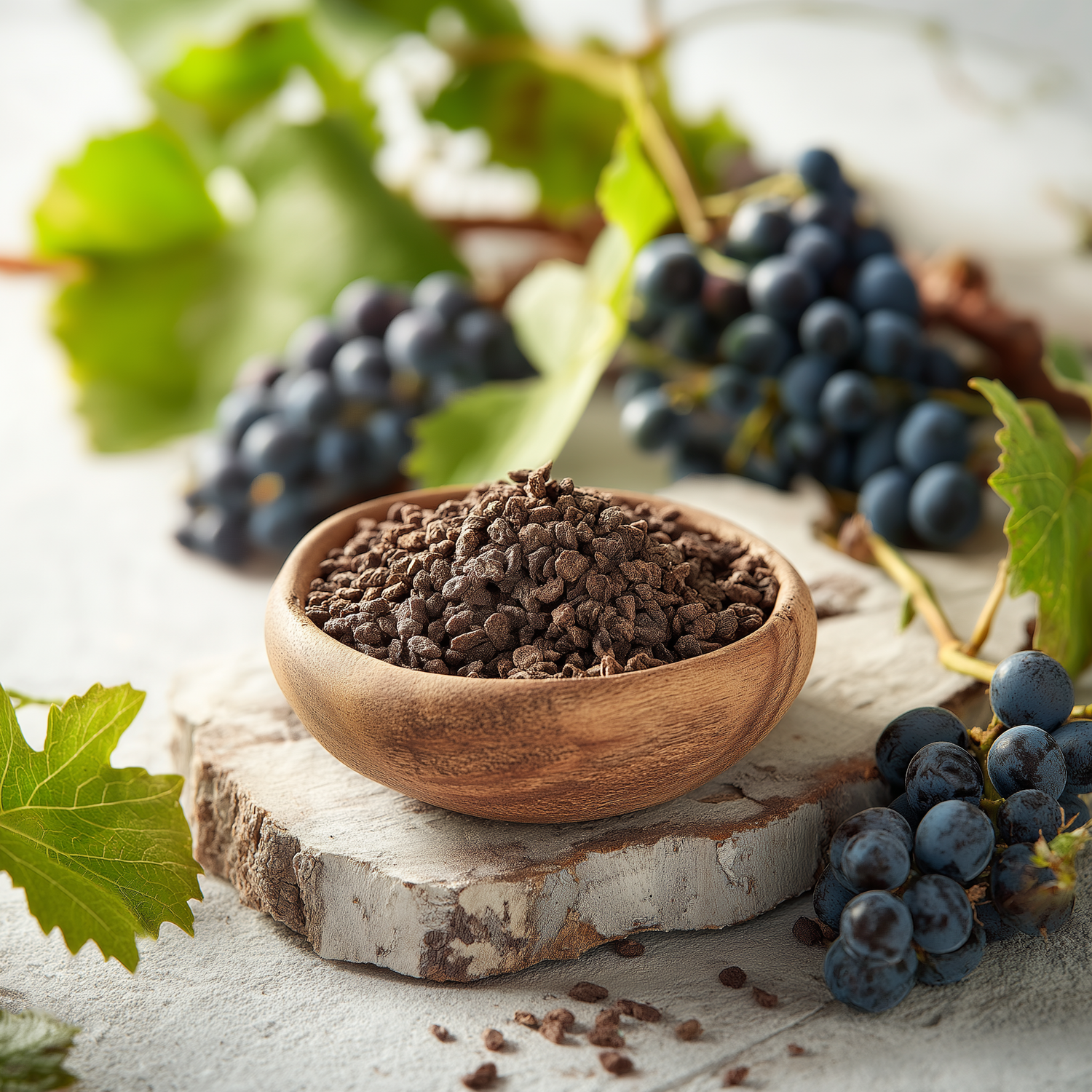Grape seed extract

Grape seed extract (Vitis vinifera) & OPC
The grapevine (Vitis vinifera) is one of humanity's oldest cultivated plants. In addition to its pulp and juice, the seeds are gaining increasing importance today. They contain oligomeric proanthocyanidins (OPCs) – secondary plant substances from the polyphenol group.
Botanical characteristics
The grapevine is a woody climbing plant belonging to the Vitaceae family. Each berry contains two to four seeds, which, during ripening, accumulate valuable secondary plant substances, particularly OPCs, catechins, and tannins.
Ingredients
Our product OPC grape seed extract (advertisement) contains per daily dose (1 capsule):
- 500 mg grape seed extract
- of which 250 mg OPC (standardized)
Standardization ensures a consistent content of defined ingredients.
Traditional use
Grapes and their seeds have been used since ancient times—both in food and in traditional herbal medicine. Their use was based on empirical knowledge from wine-growing regions.
Note: This information refers to historical uses and is not an approved health claim.
Modern use (advertising)
Today, grape seed extract with OPC is mainly offered in dietary supplements – sometimes in combination with other plant substances such as vitamin C, curcumin or resveratrol to supplement a polyphenol-rich diet.
Our product: OPC grape seed extract – standardized, pure, vegan. The extract used comes from grape seeds (Vitis vinifera) with a standardized content of 50% OPC.
Cultivation and extraction
- Seeds come from grapes of controlled cultivation
- After wine or juice production, they are dried
- Extraction is carried out with aqueous-ethanolic solutions
- Subsequent standardization to defined OPC content
Scientific studies (general information)
These studies are provided for background information only and do not contain any approved health claims:
- Antioxidant properties: Proanthocyanidins: A comprehensive review, Critical Reviews in Food Science and Nutrition (2020)
- Vascular function: Effects of grape seed extract on blood pressure, Nutrition, Metabolism and Cardiovascular Diseases (2011)
- Cell protection: Cellular antioxidant activity of grape seed extract, Journal of Agricultural and Food Chemistry (2008)
Instructions for use
- Food supplements are not a substitute for a balanced diet
- Do not exceed the recommended daily dose
- Not recommended for children, pregnant women or breastfeeding women (unless otherwise stated)
- If you have allergies or pre-existing medical conditions, seek medical advice
- If you are taking medication at the same time, consult your doctor or pharmacist
Frequently Asked Questions (FAQ)
What is OPC?
OPC are oligomeric proanthocyanidins – secondary plant substances from the group of polyphenols.
Are there approved health claims for OPC?
No – there are currently no approved health claims for OPC in the EU.
How is OPC obtained?
By gentle extraction from dried and deoiled grape seeds, followed by standardization.
Can you take OPC permanently?
There are currently no official EU dosage recommendations for OPC. Grape seed extracts are considered safe if the recommended dosage is followed. If in doubt, seek medical advice.
Legal notice
This article is for general information purposes only. There are no approved health claims for OPC under EU Regulation (EC) No. 1924/2006.
Transparency notice
The products mentioned in this article refer to products from our own range. We generate revenue from the sale of these products. Disclosures are in accordance with Section 5a of the German Unfair Competition Act (UWG) and Section 3 of the German Commercial Code (HWG).